September 25, 2020
Air Date: September 25, 2020
FULL SHOW
SEGMENTS
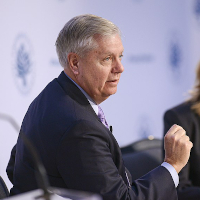
Key Southern US Senate Races and the Climate
View the page for this story
Climate and the environment are controversial subjects in several closely-watched Senate races in the Southern U.S. this fall. The South faces significant climate impacts, and a majority of citizens are concerned, but candidates are taking a low-key approach to the topic. InsideClimate News Reporter James Bruggers joins Living on Earth’s Bobby Bascomb to look at climate politics in four races in Georgia, Alabama, South Carolina, and Kentucky. (10:31)

Beyond the Headlines
/ Peter DykstraView the page for this story
On this week's trip beyond the headlines, Environmental Health News Editor Peter Dykstra and Living on Earth's Jenni Doering take a look at nurdles, tiny pellets of plastic that are turning up on coasts around the world. Then, the pair travel to the South African town of Ermelo, where coal miners are trying to switch to solar farms. Finally, Peter and Jenni take a look back ten years to Osama bin Laden's statement on the perils of climate change. (04:11)
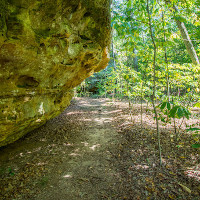
A Win for Native American Sovereignty
View the page for this story
A recent Supreme Court ruling recognized Native Americans sovereignty over millions of acres of tribal lands in Oklahoma. Rebecca Nagle is a member of Cherokee Nation and host of the podcast “This Land”, which tracks the pair of cases that led to the Supreme Court ruling. She joins Living on Earth's Jenni Doering to talk about what this ruling means after decades of ignored rights of Native American tribal members living in Oklahoma and the implications for Indian country as a whole. (11:43)
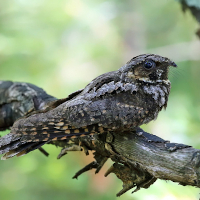
BirdNote®: Eastern Whip-Poor-Will – Bird of the Night Side of the Woods
/ Michael SteinView the page for this story
It’s officially fall in the Northern Hemisphere, and for those of us in the Eastern half of the country it’s a fine time to listen for the evening call of whip-poor-wills as they get ready to breed. BirdNote®’s Michael Stein has more. (01:55)
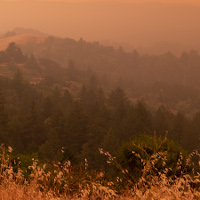
Megafire Hard Times
/ Bobby BascombView the page for this story
Wildfires have been raging throughout the US west since July, displacing hundreds of thousands of people, burning millions of acres, and cloaking the region in dangerous air pollution. Some of the people most affected by these simultaneous crises are those in the region dealing with poverty and housing insecurity. Living on Earth's Bobby Bascomb reports. (10:03)
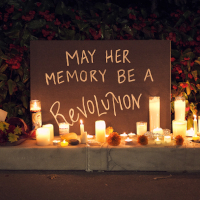
Ruth Bader Ginsburg and the Environment
View the page for this story
In addition to championing women’s rights, the late US Supreme Court Justice Ruth Bader Ginsburg left a strong and sophisticated environmental legacy. Harvard Law School Professor Richard Lazarus speaks with Living on Earth’s Jenni Doering about some of “RBG’s” key environmental votes and written opinions. (08:47)
Show Credits and Funders
Show Transcript
HOSTS: Bobby Bascomb, Jenni Doering
GUESTS: James Bruggers, Richard Lazarus, Rebecca Nagle
REPORTERS: Peter Dykstra, Michael Stein
[THEME]
DOERING: From PRX – this is Living On Earth.
[THEME]
DOERING: I’m Jenni Doering.
BASCOMB: And I’m Bobby Bascomb.
Where the candidates stand on climate in key Southern Senate races, including a climate skeptic in Alabama.
BRUGGERS: It is a race where if you have climate voters in that state, people who are really concerned about it, they'll have a clear choice. Which is the same, you know, if you're a climate voter in Georgia, you'll have a clear choice. If you're a climate voter in Kentucky, you'll have a clear choice. If you're a climate voter in South Carolina what they say is pretty similar, but you'll have a pretty clear choice.
DOERING: Also, a look back at the environmental record of the iconic Supreme Court Justice Ruth Bader Ginsburg.
LAZARUS: She was willing to look at the cases and be persuaded by their legal arguments. And therefore, when you got her vote, it meant more. You knew that she wasn't just voting for you because she liked your position as a political partisan.
BASCOMB: That and more this week on Living on Earth – Stick Around!
[NEWSBREAK MUSIC: Boards Of Canada “Zoetrope” from “In A Beautiful Place Out In The Country” (Warp Records 2000)]
[THEME]
Key Southern US Senate Races and the Climate
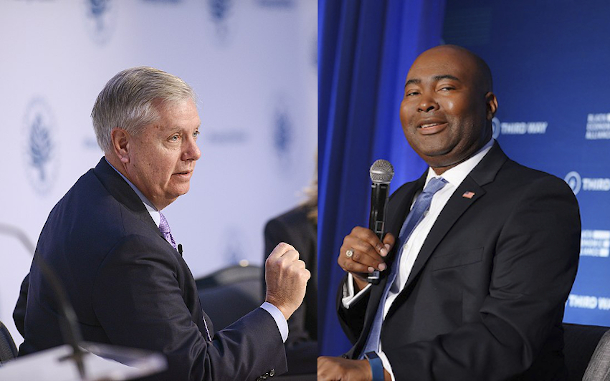
Democrat Jaime Harrison, right, is challenging South Carolina Senator Lindsey Graham, who says he supports climate legislation but has done little to advance it. (Photos: U.S. Institute of Peace, Flickr CC and Third Way Think Tank, Flickr CC)
DOERING: From PRX and the Jennifer and Ted Stanley Studios at the University of Massachusetts Boston, this is Living on Earth, I’m Jenni Doering.
BASCOMB: And I’m Bobby Bascomb.
There are several closely-watched Senate races in the south this fall, in North and South Carolina, Alabama, Kentucky; and Georgia, with 2 seats in play there thanks to a special election. And for all of these races, climate change and the environment are touchy subjects. On the one hand, a majority of residents in each of these states are “worried about global warming”, according to the latest Yale Program on Climate Change Communication data. On the other hand, candidates are fearful of alienating voters with strong language on climate change, and careful to play to the middle on the issue. Reporter James Bruggers lives in Louisville, Kentucky and covers the U.S. Southeast for InsideClimate News. He joins me now to talk about how climate change and the environment are factoring into four of these Senate races. James, welcome to Living on Earth!
BRUGGERS: Thank you.
BASCOMB: Well, let's start with South Carolina, where incumbent Senator Lindsey Graham was once seen as one of the only Republicans who would seriously work on climate legislation. Where does Senator Graham stand now on climate? And how does that compare with his challenger, Democrat Jaime Harrison?
BRUGGERS: Well, they both say similar things. And of course, Senator Graham actually has a record and Jaime Harrison doesn't. So I spent a little more time digging into Senator Graham's record. And the big thing for him is that he was, you know, back in 2010, he played this key role in President Obama losing what was a really good chance of getting some climate legislation through Congress. And he swept in there and was gonna, like, be part, find a solution, find a bipartisan solution. But in the end, he just, I guess he just sort of gave up; he abruptly pulled his support out, citing partisan politics. And there really hasn't been anything in Congress since. Senator Graham, as the election approached, he's been doing some things to try to kind of spruce up his green credentials, and they haven't amounted to anything as it relates to climate change. But there was this, there's a joint House and Senate Roosevelt Conservation Caucus, it's seeking to restore President Roosevelt's environmental legacy. And he and some members of that were supporters of this Great American Outdoors Act, which directs about 10 billion to address National Park Service deferred maintenance backlog. Harrison is running largely on, on his biography. He's a former political operative in the state. He was the first Black head of the South Carolina Democratic Party, he spent some time working in Washington. And the last I saw, the race is pretty close. And so Lindsey Graham is really kind of facing a real steep challenge. And of course, now with him, the big question is going to be Ruth Bader Ginsburg, and what role he plays as head of the Judiciary Committee, and so that probably will overshadow all of this discussion about climate change as well. But, you know, he's, he's got a record of talking a lot about the issue, but not really doing very much.
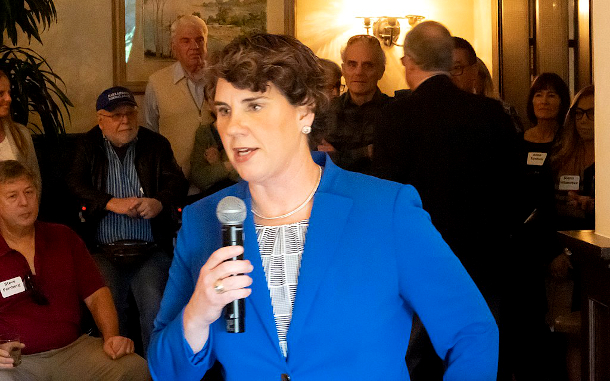
Amy McGrath is a former Marine fighter pilot who sees climate change as a global security threat. (Photo: Louise Palanker, Wikimedia Commons CC BY-SA 2.0)
BASCOMB: James, now you are from Kentucky, so I'm sure you're very aware of the Senate race there between Mitch McConnell, the Senate Majority Leader, and his challenger, Amy McGrath. How does climate and the environment play into that race, would you say?
BRUGGERS: Well, it's, it's really not playing into it at all as far as I can tell, which may make one ask well, why would we write about the issue? We pay attention to it as journalists, because, you know, whoever's in there is going to be making very important decisions. And Mitch McConnell has a record, well, I mean, he he really sort of dodged the issue for years and years; he would, reporters would ask him, "Do you believe in climate science, do you accept mainstream climate science?" And he would say, "I'm not a scientist". And reporters would come back and say, well, you're not a medical doctor, but you certainly have opinions about the Affordable Care Act or whatever else. But he did, this last year, in response to a question about the Green New Deal -- it was like one of these little gaggles where reporters were chasing him around the Capitol -- and he said he accepts climate science. So that was a first, I hadn't heard that before from him. But he still hasn't offered up a plan. And remember, he's the one who, for eight years referred to President Obama's "war on coal", and of course, Kentucky is a coal state, historically, a coal state, there's not a lot of coal being mined anymore. And there's hardly any miners left, there's still, you know, a few thousand I believe. But that's been his thing, is to defend Kentucky as a coal state.
BASCOMB: And what about his challenger, Amy McGrath, where does she stand on these issues?
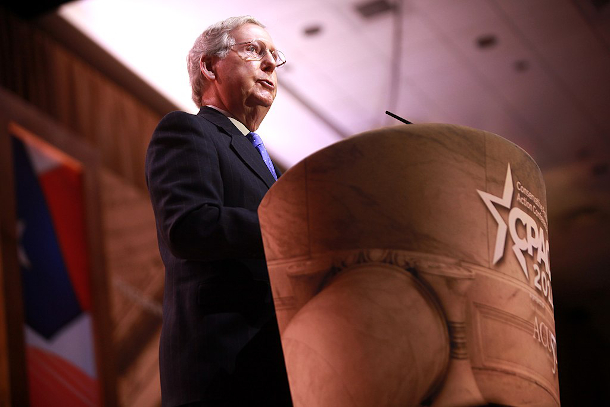
Senate Majority Leader Mitch McConnell is the longest-serving Senate Republican leader in U.S. history. He has been a long-time champion of the Kentucky coal business and has often worked against climate protection legislation. (Photo: Gage Skidmore, Wikimedia Commons CC BY-SA 2.0)
BRUGGERS: So it's been pretty hard to get elected in Kentucky to a statewide office without pledging some sort of allegiance to coal. And she's not done that. And that's actually, even though she's considered a moderate candidate, that's a pretty progressive position, just the mere fact that, you know, she hasn't been running around the state pledging allegiance to coal. Her view of climate change comes from her military experience. She's a retired Lieutenant Colonel, Marine Fighter Pilot. She's landed planes on aircraft carriers, she flew in dozens of combat missions over the Middle East. And her view of climate change reflects the view of what the Pentagon would say, that climate change is a national security threat and a global security threat. And so her position, actually, if someone ran for office in Kentucky, you know, like 10 years ago and said that, environmental community here would be pretty excited about it. But they're not; part of the problem is that there was a very popular progressive candidate who kind of came out of nowhere in the race, I say came out of nowhere because Amy McGrath, Lieutenant Colonel Amy McGrath has gotten the support of the National Democratic Party, and has raised tens of millions of dollars. She's actually outraised Mitch McConnell. And this is money flowing in from all over the country. And yet this candidate, this challenger, Charles Booker, a Black state representative from Louisville, who had a really interesting kind of campaign that he titled or called, "From Hood to Holler," and he was tying in a lot of environmental justice issues, in the West End of Louisville, which is a community that's got a lot of chemical plants and other issues, with issues that are up in the Eastern Kentucky "hollers", with environmental justice issues there. And he also supported the Green New Deal. He really rose in the polls, when there was a lot of unrest in Louisville regarding the Breonna Taylor shooting; but he came up short. And so the Democratic activists in the state, Democratic Party, they have Amy McGrath, and she's the candidate, she's still getting a lot of money. And even though she has a reasonably progressive understanding of climate change, there hasn't been as much excitement that I can tell around the climate issue and environmental issues with her as there would have been with this other candidate, Charles Booker.
BASCOMB: Well, independently of whether Mitch McConnell keeps his Senate seat, there's also of course, the question of whether or not he will retain his powerful position as the Senate Majority Leader. What has Majority Leader McConnell meant over these years for climate legislation? And how could a possible shift towards the Democrats, should they regain control of the Senate, change the game for climate legislation going forward, do you think?
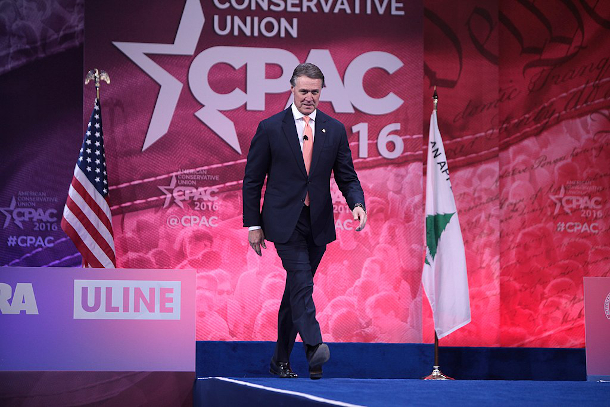
Georgia Senator David Perdue praised President Trump for pulling the U.S. out of the Paris Climate Agreement. (Photo: Gage Skidmore, Wikimedia Commons CC BY-SA 2.0)
BRUGGERS: Senator McConnell has kind of been like the defensive coach on a football team, he's like trying to stop the climate ball from getting across the, you know, the end zone. I mean, he's been resistant to really any serious effort to deal with climate change. And one thing that's important to know about Senator McConnell, I mean, the one thing that really matters to him is, is power. He wants to be in the Senate, he wants to retain his position of leadership, he wants the Senate to stay Republican controlled so that he can have as much power as he can get. But if he loses that; if he wins the election, and somehow he's no longer Senate Majority Leader, it would put the Democrats in charge of the agenda of the Senate. And then presumably they can, you know, they get to decide what hearings to have, they get to decide what legislation comes up for a vote and all that. But there's still, you know, there's still this filibuster rule with 60 votes needed to pass any major legislation. And unless the Democrats change that, you know, I'm not sure what, ultimately, a Democratic agenda, whether it's the Green New Deal, or whether it's Biden's plan or something else, I'm not sure what actually gets through Congress, you know, unless they're able to get 60 votes. Just winning Congress won't necessarily be enough.
BASCOMB: Well, let's turn now to Georgia, where a Democrat, Jon Ossoff, is challenging the incumbent Republican Senator David Perdue. What are their records on environment and climate change?
BRUGGERS: Well, okay, so Senator Perdue, who's a former CEO of Dollar General, he generally avoids climate conversations except to praise Trump for exiting the Paris Climate Agreement, for example. And he excoriated the Obama administration's Clean Power Plan, which Trump's administration has, you know, killed. And he also voted against a "sense of the Senate" resolution that climate change is real and caused by people. Ossoff is like a lot of other Democrats in that he's addressing climate change through this lens of jobs, and the coronavirus. He says that Georgia needs to rebuild from the wreckage, as he calls it, caused by the coronavirus pandemic. He's not endorsed the Green New Deal, but he's called for a major infrastructure program that includes clean energy and energy efficiency and also kind of preparing Georgia coastal communities to adapt.
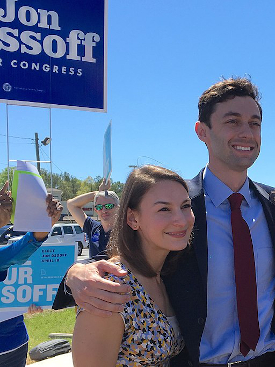
Jon Ossoff is a media executive and investigative journalist who is challenging Republican Senator David Perdue for a Georgia Senate seat. (Photo: modalt, Wikimedia Commons CC BY-SA 2.0)
BASCOMB: Now in Alabama, I understand that Democratic Senator Doug Jones is facing a challenge from a climate skeptic, Tommy Tuberville. What have those two candidates said about climate change and environmental issues?
BRUGGERS: Well, Tommy Tuberville is a football coach, was a football coach, and had a newspaper interview in a rural part of the state of Alabama a little while ago, this was a coal community in Alabama. And, you know, he said at that time, that there's only one person who can change the climate, and that's God. And in a radio interview later, he cited a conspiracy theory that somehow the coronavirus pandemic might be linked to the Green New Deal, some kind of an experiment, you know, in shutting down the economy. And Doug Jones is an interesting guy; you know, Alabama's a pretty conservative state, it's obviously being hit by hurricanes too. So yeah, so they've got, they're recognizing, I think people who live there know that climate change is something that that's happening. His approach is very common, and very, you know, I've spent a lot of my career in places that are kind of in the middle of the country, and, you know, it's a hook and bullet argument. It's a hunting, fishing argument for conservation. And he makes that case, but he also has, on occasion, clearly said that he's very concerned about climate change, and believes that we should do something about it, it's a little hard to kind of figure out exactly what he would do. But it is a race where if you have climate voters in that state, people who are really concerned about it, they'll have a clear choice; which is the same, you know, if you're a climate voter in Georgia, you'll have a clear choice. If you're a climate voter in Kentucky, you'll have a clear choice. If you're a climate voter in South Carolina -- well, it's there, it's a little hard to tell there, because they're, what they say is pretty similar, but you'll have a pretty clear choice, I guess.
BASCOMB: James Bruggers reports on the US Southeast for InsideClimate News. James, thank you so much for taking this time with me today.
BRUGGERS: I appreciate your time as well. Thanks.
Related link:
Read the InsideClimate News coverage of Key Senate Races in the 2020 election
[MUSIC: "The President's Own" United States Marine Band, "The Washington Post" by John Philip Sousa, recorded live in the John Philip Sousa Band Hall at Marine Barracks Annex in Washington, D.C. for the video titled "A Global Expeditionary Force 1866-1916," for the National Museum of the Marine Corps.]
Beyond the Headlines
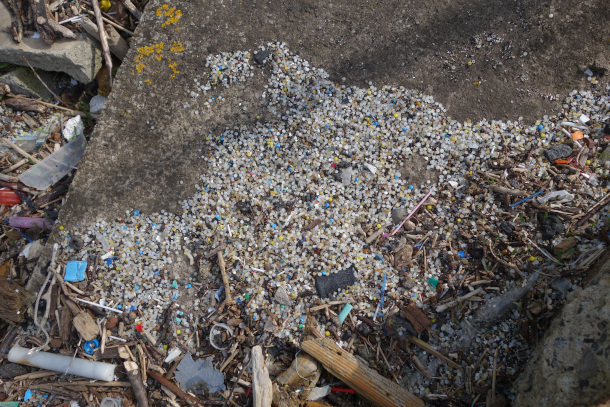
The location of a Nurdle Hunt in Port Edgar Marina, South Queensferry. (Photo: Hockadilly, Flickr, CC BY-SA 2.0)
DOERING: It's time now for a look beyond the headlines with Peter Dykstra. Peter's an editor with Environmental Health News. That's EHN.org and DailyClimate.org. Hey there, Peter, what have you got for us today?
DYKSTRA: Hi, Jenni. We're gonna start with a nurdle alert, nurdle alert.
DOERING: Oh, no, they're onto us, Peter!
DYKSTRA: No, no, no, no, that would be a nerd alert. This is a nurdle alert. Nurdles are those tiny beads of plastic, maybe a little bit smaller than the size of a pea, that serve as the basis for making all the plastic products that touch our lives, that we use every day, and that we throw out or try to recycle every day. One recent nurdle hunt in the Gulf Coast, found tens of thousands of nurdles on a short stretch of the Galveston beach. Then there are sometimes microscopic bits of plastic that are what's left of the literally billions of pounds of plastic waste, from bottles to basketballs to bags, to those little beads in our soaps and shampoos.
DOERING: But these nurdles that you're talking about, this is what, industrial waste? How does it actually get into the environment?
DYKSTRA: It's the raw product. They're spilled from tankers and tanker ships. And once they're there, they're there for all intents and purposes forever. So you've got the waste to plastics manufacturer, then you have the waste products of our end use of plastics, everything that's in our lives that touch us and we use them every day. We're building a problem in the midst of all these other problems that we're just barely coming to terms with.
DOERING: Well, what else do you have for us today, Peter?
DYKSTRA: We'll go to South Africa, there's a town called Ermelo. They stay warm, they cook their food, they get their electricity by a series of abandoned industrial scale coal mines that have been taken over by artesinal coal workers. That means people who work in part with their hands and shovels and picks to get coal to run the town to sell as a source of income and as a source of very dirty, very low paying jobs.
DOERING: Well, I mean, I guess if they have no other choice, they're just using the resources that they have.
DYKSTRA: Well, here's a choice that they've found. A lot of the local people in Ermelo, and other towns dig coal, and consider themselves environmentalists.
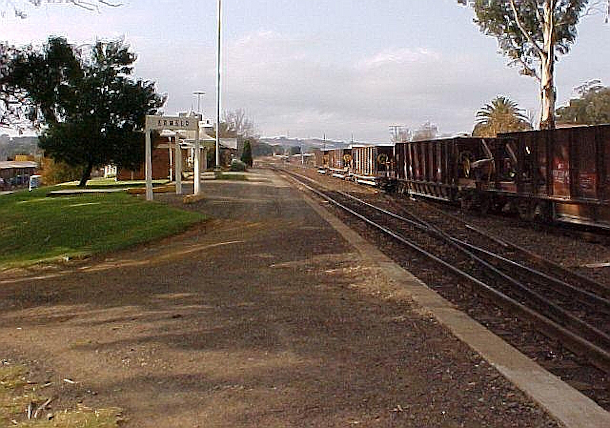
Ermelo is a town in Mpumalanga, which accounts for 83% of South Africa’s coal production. (Photo: Col André Kritzinger, Wikimedia Commons, CC BY-SA 3.0)
DOERING: Wait, really? Run that by me again, Peter?
DYKSTRA: Well, the miners are working with local climate activists to essentially put themselves out of business and convert the mining facilities into what could be one of South Africa's biggest solar projects, one of its biggest clean energy projects of any kind. The miners would then move into much safer jobs, working with solar, jobs that could pay 5 to 10 times as much as the dirty dangerous jobs they have now.
DOERING: Wow, it sounds like such a hopeful future may be just around the corner for them. So Peter, what do you have for us from the history vaults this week?
DYKSTRA: It's a 10th anniversary because on October 1 2010, one of the most famous people in the world came out with a very, very strong statement about climate change and its potential impacts.
DOERING: Oh, and who was that?
DYKSTRA: Osama bin Laden. And here's what he said: "All of mankind is in danger, because of the global warming, resulting in a large degree from the emissions of the factories of the major corporations. And yet, despite that, the representatives of the corporations in the White House insist on not observing the Kyoto Accord."
DOERING: Wow, Peter, I'll bet climate scientists were thrilled with that.
DYKSTRA: Maybe a little bit more thrilled less than a year later, in 2011, when SEAL Team Six caught up with Mr. bin Laden. He was killed, he was dumped in the ocean, where he's making his own modest contributions to carbon emissions.
DOERING: Well, thank you so much, Peter. Peter Dykstra is an editor with Environmental Health News. That's EHN.org and DailyClimate.org. Thanks, and we'll talk to you next time.
DYKSTRA: Okay, thanks a lot, Jenni. Talk to you soon.
DOERING: And there's more on these stories at our website, LOE.org.
Related links:
- Houma Today | “‘Nurdle Patrol’ Survey Finds Plastic Pellets on Almost Every Louisiana and Texas Beach”
- Reuters | “INSIGHT - Battle From Below: The South African Miners Fighting Climate Change”
- The New York Times – Green Blogs | “Bin Laden Laments Climate Change”
[MUSIC: Phil Cunningham, “Ceilidh Funk” on Palomino Waltz, by Phil Cunningham, Green Linnet Records]
BASCOMB: Coming up – Native Americans in Oklahoma win a ground breaking Supreme Court case for tribal sovereignty. That’s just ahead on Living on Earth.
ANNOUNCER: Support for Living on Earth comes from Sailors for the Sea and Oceana. Helping boaters race clean, sail green and protect the seas they love. More information at sailors for the sea dot org.
[CUTAWAY MUSIC: Phil Cunningham, “Ceilidh Funk” on Palomino Waltz, by Phil Cunningham, Green Linnet Records]
A Win for Native American Sovereignty
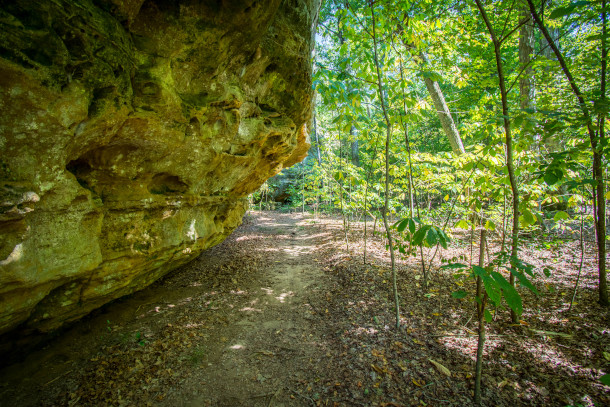
A path located in the Mantle Rock Preservation, where Cherokee would’ve walked on the 800-mile forced exodus from the Southeastern United States to Oklahoma. (Photo: Don Sniegowski, Flickr, CC-By-NC-SA-2.0)
BASCOMB: It’s Living on Earth, I’m Bobby Bascomb.
DOERING: And I’m Jenni Doering.
A recent Supreme court ruling gives Native Americans in Oklahoma renewed sovereignty over their tribal lands, an area of roughly 19 million acres. The land in question marked the end of the Trail of Tears for the five tribes that underwent that forced relocation in the mid-1800s: the Cherokee, Chickasaw, Choctaw, Seminole, and Muscogee Creek. They built a new life in Eastern Oklahoma, only to have their land stripped away, bit by bit, over the next century and a half. Now in an historic 5-4 decision for which Justice Neil Gorsuch wrote the majority opinion, the Supreme Court reaffirms that the boundaries of Muscogee Creek Nation still exist. So the tribe, not the state of Oklahoma, holds some key jurisdictional powers. Rebecca Nagle is a member of Cherokee Nation and host of the podcast 'This Land”, which tracks the pair of cases that led to the Supreme Court ruling. She joins us now from, Oklahoma. Rebecca, welcome to living on Earth!
NAGLE: Thanks so much for having me.
DOERING: Rebecca, could you please take us to the land in Eastern Oklahoma that you're talking about? What is it like there? And how does the day in the life of someone who lives within the Muscogee reservation compared to someone who doesn't?
NAGLE: Yeah, so, um, you know, people call eastern Oklahoma here, green country, I think a lot of people think about like planes and tumbleweeds, which does happen in western Oklahoma. But here in eastern Oklahoma, we're at the very tip of the Ozarks so there's a lot of hills, a lot of rivers, especially in the spring and summertime, it's very green and beautiful. What is happening as a result of this case, for a lot of Oklahomans, honestly not much. So tribal jurisdiction over non-Indians and non-Indians on what's called fee land, which is basically land that's like not owned by the tribe, not trust land, or not restricted land, tribal jurisdiction in those areas, and over those people is very limited. So for the overwhelming majority of people who live on Muscogee Creek nations reservation or on the reservations of any of the five tribes, their day to day life is not going to be impacted that much, by this case, the people who are impacted by it directly are tribal citizens living on our reservations. And so basically, the simplest way to say what happened is that prior to this ruling, Oklahoma was exerting criminal jurisdiction over us and Oklahoma no longer has that criminal jurisdiction. I mean, it never actually had it in the first place. It was exercising illegally and now the Supreme Court has basically told them that they have to stop. And so now crimes committed against Native Americans or by Native Americans will have to be prosecuted either by the tribe, or by the federal government.
DOERING: So in your podcast, you talk about how land is really part of the identity of Native people. There's a deep connection that goes beyond these legal boundaries that we've been talking about. Could you tell me about this connection for you as a member of Cherokee Nation? And you know, some of your fellow Cherokee members?
NAGLE: Yeah, I mean, I think what's really significant is that when we think about, like, who and what our tribe is, we are people, we are citizenry, we are a government but we're also a place you know, we're this corner of eastern Oklahoma. And this is not our original homeland, we were forcibly removed here. But after that removal, you know, we built the first courthouse west of the Mississippi, we built schools, we had a female seminary before, you know, some of the most famous female colleges like Vassar and Smith were built. And we had a thriving tribe and then Oklahoma was built on top of that, and our tribal lands were divided up, they were privatized, and a lot of the resources that our tribe had built for our citizens we were disinvested of. And so we have, since the 70s been rebuilding the modern form of our government and I think what this decision does is really strengthen that and really strengthen our sovereignty over our land. And to keep a place where our communities can thrive, where ceremonial grounds can thrive, our language can thrive I think is really important for the future of Cherokee people.
DOERING: So this whole area of eastern Oklahoma was originally Indian land all 19 million acres. So what led to the initial decrease in land of the Muscogee reservation, as recognized by the federal government and by the state of Oklahoma?
NAGLE: Yeah. So what's interesting about this decision is that what it means is that the reservation was never diminished and so their boundaries that was established by their 1866 Treaty have been intact the whole time, even though Oklahoma did not recognize it. But what Oklahoma tried to argue and say got, you know, rid of the reservation or diminished the reservation was this process called allotment. And so allotment is was a federal policy that I think a lot of people aren't really aware of but the idea was that, you know, Native people would be better off if our lands were privatized, because our tribes own land communally. And so the federal government came in and basically divided up Indian territory in eastern Oklahoma, and assigned individual plots of land to individual tribal citizens. And the net impact was devastating for tribal citizens, most of the land quickly passed to white ownership, through sale through swindle, and often through outright theft and even violence. The Indian land owners were really preyed upon by white settlers and grafters and so it's a really dark chapter in history for our tribe. The system that allotment created, like we have still been losing restricted land and land that's considered tribal land, in the century since and so I think that this decision is really important, that it sort of puts a pause on that process and lets us strengthen our sovereignty.
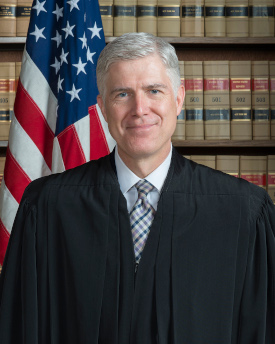
Justice Neil Gorsuch wrote the McGirt v. Oklahoma opinion which asserted Muscogee sovereignty over their reservation in Oklahoma. (Photo: Franz Jantzen, Wikimedia, Public Domain)
DOERING: So I understand that this decision from supreme court does not mean that land that is currently you know, held by non-tribal, non-native owners in the boundaries of this Muscogee reservation, it doesn't mean that it's going to be like taken away from them and transferred to the tribes. So I'm wondering what that means for regulations on the land?
NAGLE: Yeah, so the question of regulations, and I think specifically environmental regulations, looms large. Oklahoma, has pretty much embraced the oil and gas industry. Here, where I live, we have a really big problem with chicken houses and run off, you can smell the chicken poop, the ammonia just hangs in the air. We have huge algae problems in our streams and rivers, we've watched them slowly change color over the years as these chicken houses have proliferated. And the bad news is that there are some congressional bills and there's some Supreme Court decisions that actually pretty strongly restrict our tribes ability. So there's this court case from the early 80s, called Montana, that basically says that tribes on fee land, which is that like non-native on land I talked about earlier, can only exercise civil jurisdiction. So things like regulatory power, if the non-native Corporation has entered into a consensual relationship with the tribe, or is threatening the health and well-being of the tribe. And that sounds like something you could be like, hey, like you're polluting our rivers like this is making our citizens sick, like we can take you to court, but courts within the United States have almost never interpreted that standard in the favor of tribes and have almost always interpreted it in the favor of non-native Corporation. So that court case has basically stripped tribes of regulatory authority and has had some really devastating impacts. And the other thing that's actually really odd. So there are some environmental protection laws, like the Clean Water Act and the Clean Air Act that give tribes kind of the same regulatory authority as states on their reservations and there's this writer that was attached to a transportation bill, one of our senators, Mr. Inhofe, that got snuck through that actually exempts Oklahoma from that.
DOERING: Just Oklahoma?
NAGLE: Just Oklahoma. And so I believe that was passed in 2005. And so, you know, there was an article in The Washington Post about how this is going to devastate the oil industry. I mean, oil and gas was still very unhappy about this decision, they fought it very hard.
DOERING: And that's actually why the federal government got involved on their behalf, right? The Trump administration?
NAGLE: Yes, yes, the Trump administration and the federal government also argued on Oklahoma's side against the tribes. And so you had some very powerful entities, the state of Oklahoma, oil and gas, Trump administration lined up against the tribe. You know, since the decision came out, Governor Stitt has made a quote unquote, commission to chart a path forward that's basically a bunch of cronies from the oil industry and I think, like one seat to represent tribes. And so there's still this effort afoot in Oklahoma to limit tribal jurisdiction and to sort of tip the hat in the favor of the oil industry. And i think the irony in that is that we already have a lot of laws, both from Congress and decisions from the Supreme Court that severely limit tribal jurisdiction. And so if we're talking about charting a path forward, we need to talk about expanding tribal jurisdiction, not limiting it further.
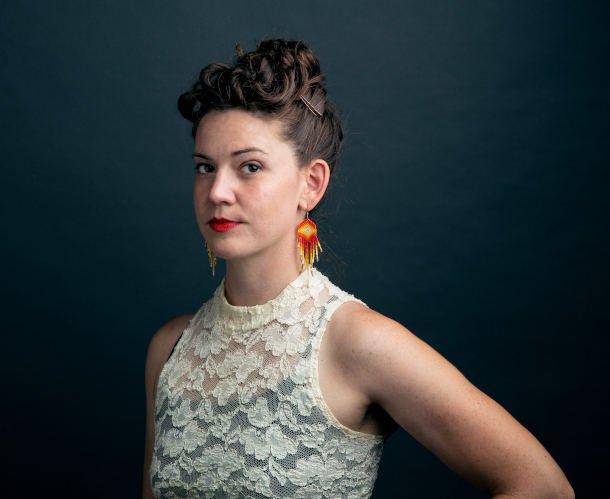
Rebecca Nagle is a writer, activist and host of the podcast ‘This Land’ which dives into the history of the McGirt v. Oklahoma case. (Picture: Courtesy of Rebecca Nagle)
DOERING: Rebecca, stolen land and broken promises, or the rule rather than the exception for native tribes in this country. Could this case hold any hope for tribes outside Oklahoma, to reclaim land that was taken from them?
NAGLE: Absolutely. You know, I think one thing that's really important for people to understand about Gorsuch's decision is that it wasn't new law. He didn't set new precedent at all. All he did was follow the law. But he followed it in a way that was very plain. You know, there's this one amazing paragraph where he says that basically, there's no other area where we would see Congress pass a law, a state not follow what Congress said and then because the state didn't follow it for so long act like the law no longer applies. He's like, show me, he's basically like, we would do that nowhere else, but we do it within federal Indian law all the time. So he kind of drew this line in the sand in the way he wrote the decision of like, we reject this thinking that because treaty rights have been violated for so long, that they're no longer valid. And that is actually is a big deal, even though it shouldn't be it's a big deal. And so we've actually already seen it applied. So there was a court case, I believe in the Seventh Circuit coming out of Wisconsin that impacted the Oneida Nation in Wisconsin and they cited the McGirt ruling and so we've already seen it, and I think that there are many passages that were very strong in Justice Gorsuch's opinion that I think we'll see cited both in briefs and in lower court rulings. So I think it will be a powerful tool when tribes are in courts and states are trying to say things like, you know, what Oklahoma said in this case is what states always say that, you know, the consequences are too great that it's ridiculous to think that after 100 years, we should recognize this land. And the Supreme Court, in their opinion, rejected that thinking. And so I think that that language will be a powerful tool for tribes moving forward. So you know, it's a huge victory, obviously, for Muscogee Creek Nation, it has very powerful implications for all five tribes here in Oklahoma but I think overall, it's a huge victory for all of Indian country.
DOERING: Rebecca Nagle is a writer, activist, a member of Cherokee Nation and the host of the podcast 'This Land'. Thank you so much, Rebecca.
NAGLE: Thank you.
Related links:
- NY Times | “Landmark Supreme Court Ruling Affirms Native American Rights in Oklahoma”
- The Guardian | “‘Icing on The Cake’: Native Americans Hail Ruling that Eastern Oklahoma is Tribal Land”
- Learn more about McGirt vs. Oklahoma
- Learn more about Rebecca Nagle
[BIRDNOTE THEME]
BirdNote®: Eastern Whip-Poor-Will – Bird of the Night Side of the Woods
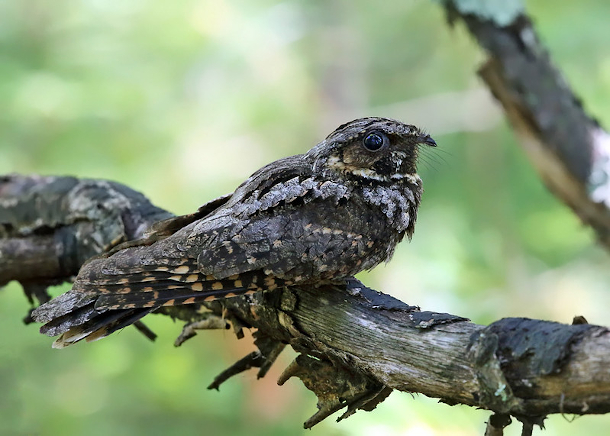
Henry David Thoreau called the whip-poor-will “a bird . . . of the night side of the woods, where you may hear the whip-poor-will in your dreams.” (Photo: Tom Murray, Flickr CC BY-NC 2.0)
BASCOMB: Well it’s officially fall in the Northern hemisphere and for those of us in the Eastern half of the country it’s a fine time to listen for the evening call of whip-poor-wills as they get ready to breed. BirdNote’s Michael Stein has more.
BirdNote®
Eastern Whip-poor-will – Bird of the Night Side of the Woods
[Whip-poor-will song throughout]
In September of 1851, Henry David Thoreau wrote:
“The Whip-poor-wills now begin to sing in earnest about half an hour before sunrise, as if making haste to improve the short time that is left them.
[Whip-poor-will song]
…They sing for several hours in the early part of the night, then sing again just before sunrise.”
Clearly and continuously, the bird announces its name [Whip-poor-will song].
In summer to early fall, Eastern Whip-poor-wills breed in woodlands of eastern North America. Their camouflaged plumage blends seamlessly with dead leaves on the forest floor. At dawn and dusk and all through moonlit nights, whip-poor-wills sally out from tree branches to hawk flying insects.
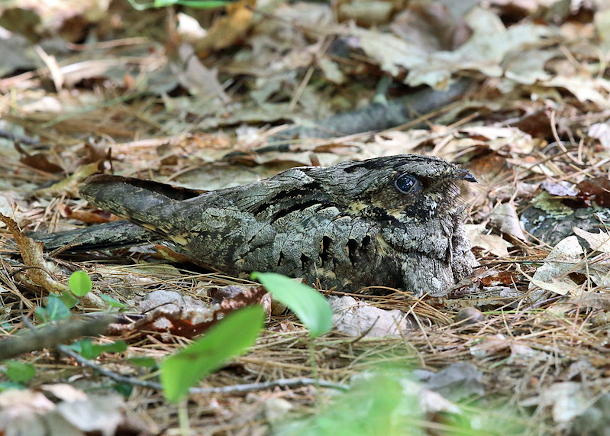
Whip-poor-wills’ camouflaged plumage blends seamlessly with dead leaves on the forest floor. (Photo: Tom Murray, Flickr CC BY-NC 2.0)
Woodland habitat has greatly diminished for Eastern Whip-poor-wills, as forests become more fragmented. The National Audubon Society lists them among the Top 20 Common Birds in Decline. Protecting and restoring large expanses of forest are crucial for many forest species, including the whip-poor-will.
[Whip-poor-will song and crickets]
It remains, as Thoreau described: “…a bird . . . of the night side of the woods, where you may hear the whip-poor-will in your dreams.”
I'm Michael Stein.
###
Written by Frances Wood; revised by Bob Sundstrom
Bird sounds provided by The Macaulay Library of Natural Sounds at the Cornell Lab of Ornithology, Ithaca, New York. Song of the Whip-poor-will (Eastern) [84871] recorded by W.L. Hershberger. BirdNote’s theme music was composed and played by Nancy Rumbel and John Kessler.
Producer: John Kessler
Executive Producers: Chris Peterson/Dominic Black
© 2015 Tune In to Nature.org September 2015 Narrator: Michael Stein
Whip-poor-will on branch - Laura Gooch https://www.flickr.com/photos/lgooch/6991532244
Whip-poor-will on ground - Jerry Oldenettel https://www.flickr.com/photos/jroldenettel/6199157613
http://birdnote.org/show/whip-poor-will
BASCOMB: For pictures, fly on over to the Living on Earth website, loe dot org.
Related links:
- Find this story on the BirdNote® website
- More about the whip-poor-will from the Audubon Guide to North American Birds
- Learn more at All About Birds
[MUSIC: Eric Clapton, “Driftin’ Blues” on E.C. Was Here, by Johnny Moore, Charles Brown, Eddie Williams, RSO Records]
DOERING: Coming up – We’ll look back at the environmental legacy of Supreme Court Justice, Ruth Bader Ginsburg. That’s just ahead on Living on Earth, stay tuned.
ANNOUNCER: Funding for Living on Earth comes from you, our listeners, and United Technologies, combining passion for science with engineering to create solutions designed for sustainability in aerospace, building industries, and food refrigeration.
[CUTAWAY MUSIC: Alison Brown Quartet, “G Bop” on Alison Brown Quartet, by Alison Brown/Garry West/John Burr/Rick Reed, Vanguard]
Megafire Hard Times
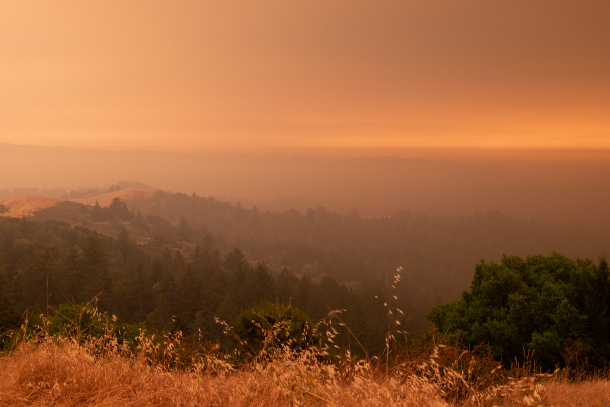
The US 2020 wildfire season has seen over 100 fires on the West Coast, with smoke from the fires reaching as far as Europe. (Photo: Justin Dolske, Flickr, CC BY-SA 2.0)
BASCOMB: It’s Living on Earth, I’m Bobby Bascomb
DOERING: And I’m Jenni Doering. So, Bobby you’ve been looking into the 2020 wildfires for us this week. What have you found?
BASCOMB: Well, where to begin… I mean this wildfire season is just off the charts. More than 5 million acres have been burned, dozens of people killed, hundreds of thousands displaced from their homes. The 2020 wildfire season is breaking records across the west coast. I read a Los Angeles Times headline that sums it up well: “The Worst Wildfire Season Ever. Again.”
DOERING: Exactly, it really seems like each year is worse than the one before.
BASCOMB: Right, and the off the scale wildfires this year released so much smoke that it actually caused hazy air as far east as Europe. And I saw a map at one point that showed nearly all of the West Coast had substandard air quality and Portland, Oregon actually had the worst air quality in the world. People were advised to stay inside and run air conditioners as much as possible but that got me thinking, what about people that can’t go inside or need to continue to work outside. So, I reached out to Jesus, he’s a farm worker currently in California picking tomatoes and originally from Mexico.
DOERING: Oh, I remember Jesus, Bobby. We talked with him back in the Spring about how he was managing to stay safe as an essential worker during the coronavirus pandemic.
BASCOMB: Right! He was really worried then about the virus. Fortunately, he’s healthy but now has a new concern – working outside every day with the terrible air quality.
[SPANISH THEN VOICE OVER]
JESUS: for the last few days the contamination has been horrible. The sky looked very cloudy and looked as though it was about to rain but it was all due to contamination. I feel really worried about my own health. I inhale the contamination. Even ash was falling here on top of cars. Going outside the contamination was really bad and it felt as though there wasn’t enough oxygen to breathe.
BASCOMB: Jesus says his employer is providing masks but not the N95 masks that health experts say people need under these circumstances, and his employers haven’t offered any advice about how to work safely.
[SPANISH THEN VOICE OVER]
JESUS: They just let us know when it’s time to get to work and that’s all. They don’t really notice the bad air quality and are just worried about the tomato harvest. They don’t seem worried about us workers.
BASCOMB: But despite the health risks, Jesus and the thousands of agricultural workers like him continue to work outside every day to harvest the food we eat. He says he has no choice.
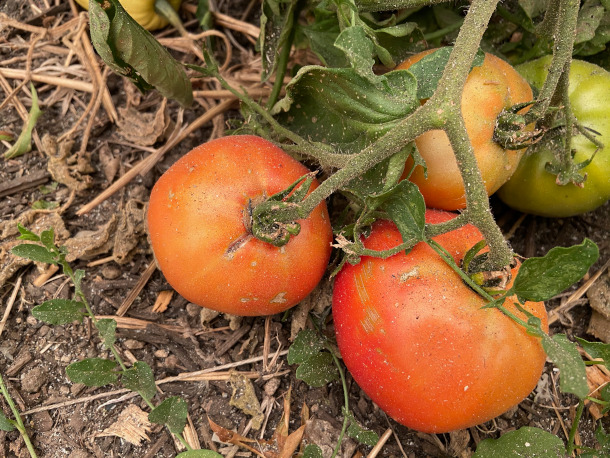
Agricultural workers have to deal with ash-covered produce and dangerous outdoor air quality. (Photo: Chris Branam, Oregon State University, Flickr, CC BY-SA 2.0)
[SPANISH THEN VOICE OVER]
JESUS: In reality us field workers have to keep going to work because if we don’t work we won’t make money. We don’t have any form of government assistance to support us and stay at home. We have to go in order to be able to eat. We have no other option than to deal with the bad air quality and continue working.
BASCOMB: And Jenni, regardless of the work they do immigrants, like Jesus, are often more at risk than the general population during catastrophic events like a wildfire.
DOERING: Oh really, why is that?
BASCOMB: Well, for one they may not speak English and so they often aren’t getting the same information about hazards and evacuations quickly. And many recent immigrants work low paying jobs and don’t have savings to fall back on if they lose their homes or can’t work. I spoke to Joel Iboa with Causa. That’s an immigrant rights organization based in Oregon that provides relief services for the Latinx community there.
IBOA: Immigrants are in a position in which their lives are more likely to be destroyed by an inconvenience like a wildfire than say family with a nice house in Mackenzie.They can afford to pay to stay in a hotel or you know, may have another home. But you know, a lot of these immigrant families, the homes they were in was all that they had. And that's what's particularly awful.
BASCOMB: Joel told me about a trailer park in Phoenix, Oregon that was home to a large immigrant community and was completely destroyed by the fires.
IBOA: And the reason why it's so devastating is we're not just talking about, you know, one or two family members, we’re talking about generations of families that live in one area. So you could have sort of a grandfather and a grandma living in one unit. And then right across the street, you know, it's their, their kids, or their grandkids. And so we had this trailer Park community that was pretty tight knit, and multi generational, and it overnight just burned to the ground.
DOERING: Oh, Bobby… that’s just heart breaking.
BASCOMB: Yeah, it really is. I mean if you or I lost our home tomorrow we both probably have family somewhere else that we could stay with. But when your entire family and basically everyone you know lives in the same complex, and it’s destroyed by a fire it leaves you essentially homeless with no one to turn to. Joel is working with the Oregon Relief Fund to provide some financial support, especially for undocumented immigrants who can’t access federal funds. But really it’s an untenable situation.
DOERING: Are they able to access homeless shelters at least?
BASCOMB: Well, yes and no. Many homeless shelters were already operating at reduced capacity because of the virus. Understandably, they didn’t want to pack too many people into a small space. So, the demand is high but availability is low and in many areas of the country that has meant more people, of all cultures not just immigrants, living on the street.
DOERING: So, what are cities doing to try to help or accommodate people that have been displaced?
BASCOMB: Well, I talked to Vivian Ho about that. She’s a staff writer for the Guardian and has written a lot on the issue of homelessness. She says that when Covid first hit and homeless numbers shot up, some cities like San Francisco set up outdoor encampments for the homeless. She visited one of the camps in the early days of the fires and described what it was like to spend time outside there.
HO: Just 10 minutes outside and it feels like you are choking. It sticks in your hair. It clings to you. Your lips are cracked, your skin is cracked. It's just the most awful, terrible sensation there is and to know that there are people out there sleeping in this because they don't have another choice. It's just heartbreaking. It's inhumane.
DOERING: Wow, Bobby, so how are people in these camps dealing with the terrible air quality if they can’t escape indoors?
BASCOMB: I put that question to Vivian and she basically said that many people she spoke to are just kind of resigned to it.
HO: If you talk to anybody else in California, it's all they can talk about the wildfire smoke and how much they hate it. But for people who are actually sleeping in it, who have ash pouring down on their heads, who are sweeping it off of their coolers, who are sweeping it off of their food, they just think it's another day because their conditions are already so bad that it's just one more thing to deal with.
BASCOMB: But Jenni, for people that are homeless and have underlying health concerns it’s a different story. For someone with pre-existing lung disease or asthma being outside right now can be a death sentence. Even for healthy people breathing in wildfire smoke day after day can cause headaches and sore throats in the near term and respiratory problems and cardio vascular concerns long term. And on the West Coast alone there are hundreds of thousands of people living without adequate housing. So Vivian says we are going to be looking at a lot of people with very serious health problems in the future as a result of being unsheltered now.
DOERING: I’m sure the cities and states are aware of the potential health problems for people living outside, authorities are advising people to avoid going outside as much as possible after all. So, what are cities doing to help people who can’t go inside?
BASCOMB: Well, it really depends. A lot of states and cities are understandably focused on controlling the fires and just barely keeping it together with that so helping the homeless community is kind of an afterthought in many cases. But a lot of non-profits are stepping in to sort of fill the void. I came across a small organization called Mask Sonoma. They began handing out N95 masks back in 2017 during that year’s devastating wildfires. They gave them to homeless people and vineyard workers who couldn’t go inside to escape the smoke.
DOERING: That sounds like some good foresight.
BASCOMB: Yes! I spoke with Miles Sarvis-Wilburn at Mask Sonoma and he made a really good point. You know, there are so many awful things happening today between the virus, wildfires, hurricanes, social unrest… it can all feel so disheartening and overwhelming but he says there is power in numbers when it comes to trying to help in some small way.
Despite blue skies our meter told us the AQI was 150+, unhealthy for extended outdoor exposure. If outdoors please we a P100, N95, or KN95 and stay hydrated. Do not be fooled by the apparent good air quality! pic.twitter.com/tNTHThBbJL
— Mask Sonoma (@masksonoma) September 15, 2020
Mask Sonoma and other mutual aid organizations specifically cater to people experiencing homelessness and extreme poverty.
SARVIS- WILBURN: The main takeaway for me would be our collective strength as just people. Oftentimes we feel isolated, especially if we're quarantining. So we're at home, and we have the internet. So all we're doing is reading about everything bad that's happening and feeling well, I can't do very much about any of that. Well, what little, you know, mutual aid organizations like our show is that actually, you can do a ton. I feel like I'm really capable of doing my little bit and so that is one way to go forward in a time when, the situation is probably not going to ameliorate in the near future.
BASCOMB: And Jenni, Miles reminded me that where he lives in Sonoma, California the wildfire season doesn’t really start until October so the 2020 wildfire season is far from over. And of course with climate change creating hotter, drier conditions across much of the West scientists are telling us to expect more intense fires in the future.
DOERING: So, it sounds like the most vulnerable people in society are going to need more support going forward.
BASCOMB: Exactly.
Related links:
- The New York Times | “Wildfires Are Among 4 Recent Disasters Costing at Least $1 Billion”
- The Guardian | “Homeless Californians Face New Crisis: Living Outside in Smoke-Filled Air”
- Mask Sonoma’s Facebook Page
- More on Causa
[MUSIC: 6ix9ine, “AVA” on Tattle Tales, by Ronny J, RicoOnTheKeys, Tupun & 6ix9ine, ScumGang Records]
Ruth Bader Ginsburg and the Environment
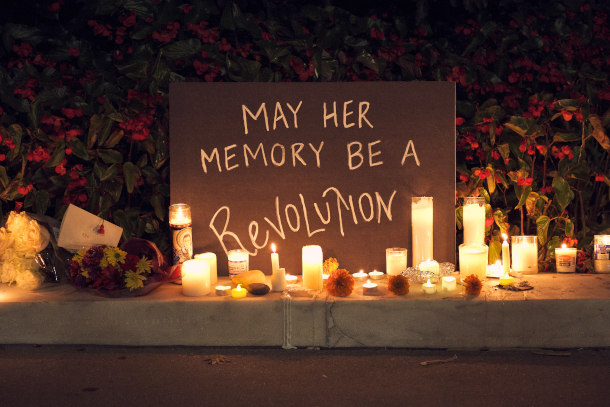
A vigil for the late Justice Ginsburg at the Supreme Court. (Photo: Geoff Livingston, Flickr CC BY-NC-ND 2.0)
DOERING: Supreme Court Justice and liberal icon Ruth Bader Ginsburg recently passed away at the age of 87. She was only the second woman to ever sit on the court, and was best known for championing women’s rights. But she also leaves behind a remarkable environmental legacy. For more, I’m joined now by Harvard Law Professor Richard Lazarus, the author of The Rule of Five: Making Climate History at the Supreme Court. Welcome back to Living on Earth!
LAZARUS: Delighted to be here, Jenni.
DOERING: So in Justice Ruth Bader Ginsburg's nearly three decades on the court, there were quite a few landmark environmental cases. Could you tell us a few examples of times that Justice Ginsburg provided an important vote in some of the more contested cases?
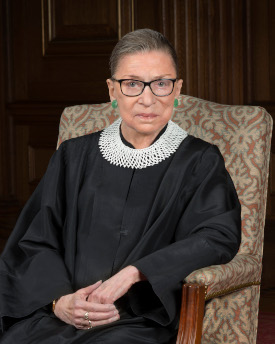
Ruth Bader Ginsburg served on the Supreme Court for 27 years. (Photo: Supreme Court of the United States, Public Domain)
LAZARUS: Yeah, absolutely. So she was on the court for 27 years. She joined the court in 1993, not a justice for any particular reputation on environmental issues one way or the other. But you know, it's been a pretty contentious court for the past 27 years. And a lot of cases are decided by a sharply divided vote. You know, the classic example is one of my favorites. And that's Massachusetts v. EPA, largely considered probably the most important environmental case ever decided by the US Supreme Court. The decided 2007. And it was a 5-4, and Ginsburg's vote was like the other five in the majority, it was the decisive vote. And that was a case in which the court established that EPA had authority to regulate greenhouse gases under the Clean Air Act, which EPA had rejected, said it didn't. And it also no less importantly, established that a plaintiff who alleged climate injury had the right to bring a case in federal court based on an injury Article 3, standing a hugely significant decision in its own right.
DOERING: Yes, that's right. You actually published a book about Massachusetts v. EPA. So it really was, like you said, one of the most important environmental cases, perhaps the most important environmental case ever to come before the Supreme Court. So I'm wondering about any other examples you might have of times that Justice Ginsburg provided an important vote in some of these, you know, key environmental cases in the court.
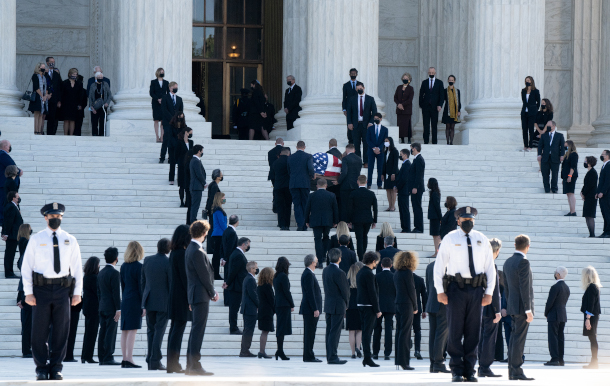
Justice Ruth Bader Ginsburg’s casket being carried into the Supreme Court. (Photo: Victoria Pickering, Flickr CC BY-NC-ND 2.0)
LAZARUS: Well, she did several cases, not only had the important vote, she wrote the opinion for the court, which is even more than providing the vote, I would say of the cases she wrote the opinion for the court, the one that we front center is a 2000 case called Friends of the Earth v. Laidlaw. That was a case in which a group of citizens brought a lawsuit under the Clean Water Act, alleging violations by the Laidlaw industrial facility for violating the Clean Water Act with hundreds of violations of mercury. The lower courts, the Court of Appeals had held that the environmentalists lacked standing, they lacked the requisite injury to bring the lawsuit. And the Court reversed. Justice Ginsburg wrote a tour de force in that opinion, establishing not just that these particular environmental plaintiffs had standing to bring their particular Clean Water Act suit. But she announced a new test for environmental plaintiffs' citizens standing which dramatically confirmed but a lot of people long believe that the Supreme Court had sort of eroded over time. And that is the right of people to bring these suits based not necessarily on a very hard and fast showing of adverse impact on the environment. But based on the reasonable concern, that there have been such an impact and the injury that posed on them the concern itself, without a greater showing that was a hugely important ruling by the court. And Justice Ginsburg crafted it quite nicely.
DOERING: I'm wondering to what extent was Justice Ruth Bader Ginsburg a reliable vote in environmental cases? Or maybe did it perhaps depend on each case?
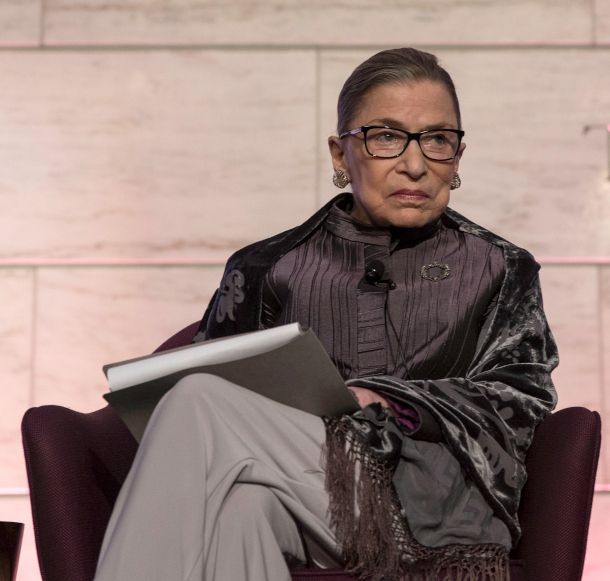
According to Lazarus, Justice Ginsburg should be remembered for her integrity and her skills as a lawyer (Photo: National Museum of American History, Flickr, CC BY-NC 2.0)
LAZARUS: It depended on each case. I mean, there's no question if you look at all the cases, all the environmental cases before her over 27 years, she voted most frequently with environmentalists, that's unambiguous, but she did not vote always for them. And that is what gave her real credibility and actually confirms her integrity, you had to earn her vote. And if you could not persuade her the legal merits of your position, you could have the best environmental policy in the world, and you would not get her vote. I'll give you an obvious an example of this involving actually the same issue. And that is global climate change, which we know she cared deeply about. About a decade ago, there was a case for the United States Supreme Court called American Electric Power v. Connecticut. It was a case in which a group of states, a group of environmental groups had sued the electric utility industry. And they argued that their contribution of greenhouse gas emissions to the atmosphere were unlawful because they amounted to a nuisance under the federal common law. The lower court had actually ruled in favor of the plaintiffs, in favor of the states, in favor of environmental groups in a sweeping across the board winning. The Supreme Court took that case, they reversed. The opinion was authored by Ruth Bader Ginsburg. She explained how there was no merit to their claim, how their federal common law nuisance claim had been displaced and had been displaced by the Clean Air Act. And whatever remedy they wanted to address climate change, as far as federal law was concerned, they'd have to seek it under the Clean Air Act. And if that meant the Clean Air Act didn't address their concerns adequately, so be it. It was recent, right, precisely, rigorously, carefully. It was not unsympathetic. It was not an opinion which suggested that there was something untoward about what they were doing. And it was an opinion, which probably because of Justice Ginsburg, went out of its way to explain how the Clean Air Act did provide some avenues for relief. But when it came to the merits of what they saw it, she clearly didn't hesitate. And not only voted against them, but agreed to write the opinion for the court. And that's not the only time. You can find, you know, handful of cases over 27 years, when she just didn't believe that the improper arguments had merit.
DOERING: Hmm. Professor Lazarus, how should we remember Ruth Bader Ginsburg, from an environmental law perspective, do you think?

A mural of Ruth Bader Ginsburg in Washington, DC. (Photo: Ted Eytan, Flickr, CC BY-SA 2.0)
LAZARUS: I think she should remembered first and foremost as a great lawyer, just an outstanding lawyer, someone who did not come to the cases, sort of predisposed to necessarily rule in favor of environmentalists but who came with an open mind, and came at undoubtedly with some inherent sympathy to them. And not as a skeptic, though. She was willing to look at the cases and be persuaded by the legal arguments. And therefore when you got her vote, it meant more, you knew that she wasn't just voting for you, because she liked your position as a political partisan. She was voting for you because you earned her vote with the strength of your legal argument. That's a great legacy for a judge. It's a terrific legacy for justice, you can't expect anything more really than that, which is someone's going to give you a fair shake, they're actually can consider the merits and strength of the argument. And if they're strong, you win, if they're not strong, you shouldn't win. You do the best you can. It's the best legacy you can have. And in the process, over 27 years, she made her mark. She made her mark in environmental cases, by writing significant opinions. She made a mark by providing dispositive votes in cases of enormous historic significance. She made her mark by dissents. Dissents in opinions she wrote, which will be read and heard by people for decades, and maybe persuade future justices. And yes, she even made her mark by sometimes ruling against environmentalists. That's what made those votes in their favor. All the more important.
DOERING: And from an environmental perspective, what do you think the court will look like now without Justice Ruth Bader Ginsburg, what environmental cases are on the docket now?
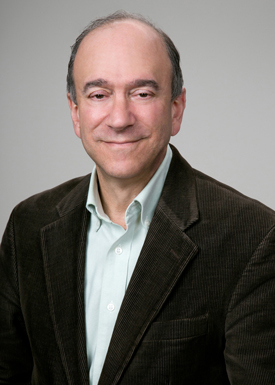
Richard Lazarus is a Professor at Harvard Law School and has presented oral argument before the Supreme Court in 14 cases. (Photo: Courtesy of Harvard University Press)
LAZARUS: Well, they're gonna miss her. They're gonna miss having such a good lawyer in the midst, and she's one of the best lawyers, the court has had for decades. In the immediate term, they're no hugely pressing cases before the court, they'll miss your voice. And obviously, if you replace a Justice Ginsburg with a justice, who is more like Justice Kavanaugh is, that could make a big difference in cases. That could play a major role in limiting the ability of a future EPA to protect public health and welfare under existing statutes. If Congress is able to pass new laws that are tougher than that problem goes away.
DOERING: Richard Lazarus is the Howard and Katherine Aibel Professor of Law at Harvard Law School. Thank you so much, Professor.
LAZARUS: Thank you so much. I was glad to be with you again.
Related links:
- About Richard Lazarus
- Living on Earth’s interview with Richard Lazarus about The Rule of Five, his book on Massachusetts v. EPA
[MUSIC: Michael Jonathon, “Woody’s Poem” on Legacy, by Woody Guthrie and Franz Schubert/arr.Michael Jonathon, Poet Man Records]
BASCOMB: Living on Earth is produced by the World Media Foundation. Our crew includes Naomi Arenberg, Paloma Beltran, Jay Feinstein, Leah Jablo, Don Lyman, Isaac Merson, Aaron Mok, Aynsley O’Neill, Jake Rego, Casey Troost, and Jolanda Omari. Tom Tiger engineered our show. Alison Lirish Dean composed our themes.
DOERING: You can hear us anytime at L-O-E dot org, Apple Podcasts and Google Podcasts, and like us, please, on our Facebook page - Living on Earth. We tweet from @livingonearth. And find us on Instagram at livingonearthradio. Steve Curwood is our executive producer. I’m Jenni Doering.
BASCOMB: And I’m Bobby Bascomb. Thanks for listening!
ANNOUNCER: Funding for Living on Earth comes from you, our listeners, and from the University of Massachusetts, Boston, in association with its School for the Environment, developing the next generation of environmental leaders. And from the Grantham Foundation for the protection of the environment, supporting strategic communications and collaboration in solving the world’s most pressing environmental problems.
ANNOUNCER 2: PRX.
Living on Earth wants to hear from you!
Living on Earth
62 Calef Highway, Suite 212
Lee, NH 03861
Telephone: 617-287-4121
E-mail: comments@loe.org
Newsletter [Click here]
Donate to Living on Earth!
Living on Earth is an independent media program and relies entirely on contributions from listeners and institutions supporting public service. Please donate now to preserve an independent environmental voice.
NewsletterLiving on Earth offers a weekly delivery of the show's rundown to your mailbox. Sign up for our newsletter today!
 Sailors For The Sea: Be the change you want to sea.
Sailors For The Sea: Be the change you want to sea.
 The Grantham Foundation for the Protection of the Environment: Committed to protecting and improving the health of the global environment.
The Grantham Foundation for the Protection of the Environment: Committed to protecting and improving the health of the global environment.
 Contribute to Living on Earth and receive, as our gift to you, an archival print of one of Mark Seth Lender's extraordinary wildlife photographs. Follow the link to see Mark's current collection of photographs.
Contribute to Living on Earth and receive, as our gift to you, an archival print of one of Mark Seth Lender's extraordinary wildlife photographs. Follow the link to see Mark's current collection of photographs.
 Buy a signed copy of Mark Seth Lender's book Smeagull the Seagull & support Living on Earth
Buy a signed copy of Mark Seth Lender's book Smeagull the Seagull & support Living on Earth

